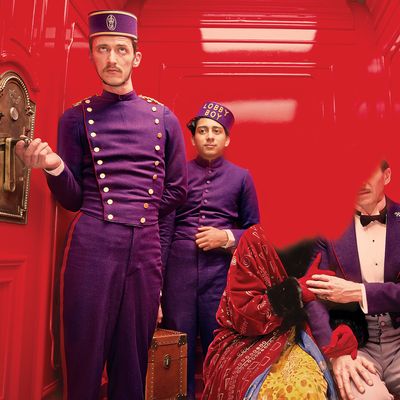
Wes Anderson’s latest cinematic styling is The Grand Budapest Hotel, an exquisitely calibrated, deadpan-comic miniature that expands in the mind and becomes richer and more tragic. Anderson tells a story within a story within a story. (There might be one more story—I lost track.) First, a young girl pays tribute to the statue of a dead author; then said author (Tom Wilkinson) narrates a trip that his middle-aged self (Jude Law) took to a Mitteleuropäisch hotel, the Grand Budapest, faded but with remnants of its older opulence; and finally, the owner, Mr. Moustafa (F. Murray Abraham), recounts to the author his time between the world wars as a lowest-of-low lobby boy known as Zero (Tony Revolori) under the tutelage of the legendary concierge, Gustave H. (Ralph Fiennes). Anderson’s inspiration comes from the late Stefan Zweig, who wrote with an abundance of detail, fearful the past would pass from memory and therefore cease to exist. Anderson materializes Zweig’s world as if answering a prayer. Not literally. The Grand Budapest Hotel has no pretense to realism: Its mode is whimsical impressionism. But the artists share a common loneliness, and their twin yearnings merge.
The movie’s philosophical core is in its palette, starting with Anderson’s trademark off-symmetrical frames, increasingly precarious seesaws of shape and color. He is, however, beginning to break out of his (over)reliance on tableaux vivants. The mountainside hotel is a dollhouse reached by model train, but inside it’s like Dr. Who’s tardis: Vistas expand, contract, and pirouette. The lobby choreography is busy, layered, militaristically efficient. The colors are intense: pink walls, crimson carpets, staff waistcoats of electric magenta. Has Anderson ever designed a house? Imagine a walking tour of favorite directors. Tim Burton could build a cave across the street. Paul Greengrass’s place would be on a canal to simulate nonstop Shakicam. I digress, but Anderson makes you dream of designs for living on a higher (or funkier) plane.
There’s a melodramatic plot, if you’re wondering. Gustave treats his customers with deference and his rich-old-lady customers with concupiscence—he fucks them silly. One (Tilda Swinton, withered by greasepaint and putty) has a premonition of her death, and when news comes that she is, indeed, gone, Gustave grabs the boy Zero and boards a dangerous train—there’s yet another war breaking out—for her manse. Soon he’s being blamed for her murder and hunted by police (led by Edward Norton’s Henkels, who has a story of his own about Gustave befriending him as a lonely lad) and a macabre, grim-faced assassin (Willem Dafoe). The last half of The Grand Budapest Hotel has a madcap abandon undreamed of in other Anderson movies, with a chase through the Alps that’s staged and shot like a pipe dream of flight. Fellow European concierges lend the lamming Gustave a hand, much as sundry guest stars lend their wattage to the movie: Bill Murray, Jeff Goldblum, Owen Wilson, Adrien Brody, Jason Schwartzman, Harvey Keitel, Matthieu Amalric, Bob Balaban. Anderson is a sort of Pied Piper who picks up actors as he goes along: Sure, Wes, I’ll put on a costume and let you pose me for a day. It would be nice if these actors had, you know, roles. But pop-up cameos have been a source of pleasure in movies from almost year one, and they give Anderson’s mise-en-scène a family vibe.
Anderson’s visuals are so witty and exacting they transcend camp, but his dialogue, alas, doesn’t: It’s twee in the extweem. An old stage pro like Fiennes can speak his speeches trippingly and make them sound Wildean (his aplomb is gorgeous), but I can’t remember a single one of Gustave’s lines, and he’s by far the most eloquent character. The boy, Zero, is the audience’s stand-in, which means he largely stands there, mouth-breathing. He listens, obeys Gustave’s orders, and runs and hides on cue. His romance with a pretty girl (Saoirse Ronan) with a geographically fascinating birthmark has nothing as deft as the rapport between prepubescents in Moonrise Kingdom. The best, least predictable dialogue in an Anderson movie is in The Darjeeling Limited, written with Schwartzman and Roman Coppola. The best, least predictable performance is Gene Hackman’s in The Royal Tenenbaums, largely because Hackman’s ferociously stubborn Method went against the too-smooth Anderson grain. (Hackman reportedly didn’t take well to being given line readings.) One reason I don’t respond as fully to Anderson’s movies—even this one—as his critical groupies is that his characters are so small, monotonous, dear. To maintain childlike wonder, an artist doesn’t need to turn his or her people into simpletons.
There is, to be fair, a case you can make for the movie’s campy ingenuousness. It seduces you even as Anderson hints at the deadliness lurking in this high society’s margins. It leaves you undefended for the final emotional wallop. There were a mere 15 years between the gruesome, senseless slaughter of World War I and the Reichstag fire that presaged the devastation of Europe by Fascists, and this magical wisp of an era would pass. The final scenes are handled with delicacy: You don’t cry so much as shiver. And then you slowly begin the readjustment to a world in which the people are less exuberant, the proportions less harmonious, the colors less vivid.
The Grand Budapest Hotel, Directed by Wes Anderson, Fox Searchlight, R.
*This article appeared in the February 24, 2014 issue of New York Magazine.





